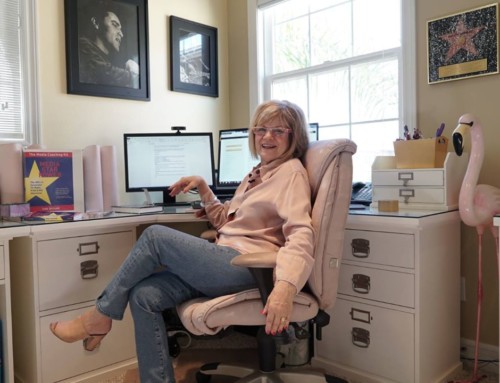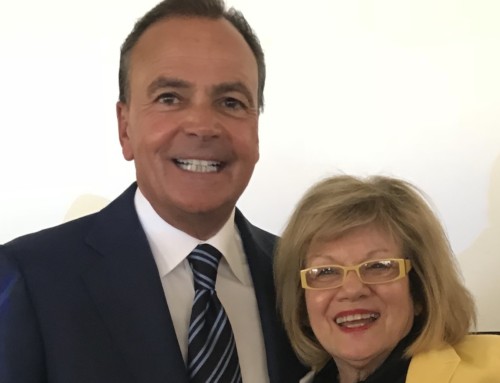Ariana Huffington Thrive Global
w/ Judy Jernudd
I had the pleasure of interviewing Judy Jernudd, founder of the Jernudd Professional Development Company and COBE, the Collaboration of Brilliant Entrepreneurs & Executives. Her experience in Television news and as a TV talk show personality provided her the opportunity to interview or socially interact with many of the world’s most influential personalities in film, sports, business, television and politics. The Jernudd Company experiential leadership and presentation programs are based on the skills and techniques of influential leaders.
Thank you so much for joining us! Our readers would love to “get to know you” a bit better. Can you tell us a bit about your ‘backstory’ and how you got started?

Know Thyself. When I was 12 years old my mother bought her first restaurant. She put me in the position of salad maker. That position lasted two weeks when I decided lettuce and tomatoes were not long in my career. I begged and pleaded with my mother to let me “go out front” with her and wait on the customers. Finally, she relented. When she bought her next restaurant, I took over managing the first one at the age of 16.
Indeed, I was fortunate to know at 12 that behind-the-scenes was not in my future. Serving customers and managing that first restaurant provided on the job training and real life-long lessons. I learned the value of customer experience, the importance of every person in the company, a work ethic, public relations, entrepreneurial skills, leadership and management of every position from the lead chef to the bus boy. To this day I am thankful to my mother for the opportunity of those life empowering skills.
What do you think makes your company stand out? Can you share a story?
The Jernudd Company is focused on results. Our communication and entrepreneurial programs are based on experience, processes and outcomes. When clients work with us, they often have specific issues that need solutions in real time. Rather than theoretical or textbook our programs are experiential and interactive, which expedites the client’s learning curve to take ownership of the skills.
We also listen to our clients. For example, when I first launched The Jernudd Company, I thought our business was communication. Then I started asking clients for specific feedback. The results were almost unanimous — -and surprising. Yes, we were in the communication business, however, leadership was at the top of the value add. They made statements such as, “I am a more effective leader or my confidence as a leader has improved.” Asking and listening changed the direction of our business.
Can you share the most interesting story that happened to you since you started your career?
Oftentimes in careers, as in life, opportunities come your way that you did not plan. My career started in public relations in Los Angeles. One of my clients appeared on a TV show and just after her interview, everything changed. The producer came up to me with a pointed finger waving and said, “You are missing the boat. You belong in front of the cameras, not your clients!” Even though they weren’t looking for a TV talk show host, she gave me an audition. After the audition, she was quick to say, “You are ready for television!” My philosophy is simple: sometimes you see qualities within yourself, other times people see them in you first. Acting on opportunity is the difference in greater achievements.
Can you share a story about the funniest mistake you made when you were first starting? Can you tell us what lesson you learned from that?
During my first live TV appearance I talked so fast even I didn’t understand what I said. My first question to my friends and family, “How was it?” They said, “You looked good, but I didn’t understand a thing you said!” The lesson? Slow down and think about what you are saying so people hear your message.
My television career in news and talk shows are the methods in our communication coaching programs. The skills it takes to connect on camera with thousands of people watching you are the same skills and techniques transferable to business communication with employees, clients, analysts or board of directors.

What advice would you give to other CEOs and business leaders to help their employees to thrive and avoid burnout?
Think of your employees as valuable to the company as yourself. We know through COBE, our Collaboration of Brilliant Entrepreneurs & Executives coaching program, that entrepreneurs can do many things well. However, it does not mean they should have their fingers in everything. It stifles the employee’s growth, production and can lead to burnout to the point of losing key employees. Check-in often and ask questions about “How is it going,” rather than telling.
How do you define “Leadership”? Can you explain what you mean or give an example?
Leadership requires open communication, accountability, transparency, the ability to inspire and exceptional people skills.
Imagine developing a 16 million dollar product that isn’t selling. One of our technology clients, with a Fortune 500 company, faced this challenge. After a competitive analysis, they learned it was not the cost of the product or the service agreements. It was the presenters. I was retained for one week to revamp the sales presentation, work with marketing and the VPs involved with the product.
About three days into my coaching program, I had to ask, “What is it about your CEO that every group in here raves about him when he isn’t even in the building?” The accolades started flowing: “He talks to us. He knows our names, he looks us in the eye when talking with us. He asks about our families.” These are obtainable people skills and attributes that define excellent leadership.
In my work, I often talk about how to release and relieve stress. As a busy leader, what do you do to prepare your mind and body before a stressful or high stakes meeting, talk, or decision? Can you share a story or some examples?
Preparation is key. It reduces stress, decreases anxiety and you feel more in control in high stakes situations. It allows you to get sleep when you need to perform at your best, In fact, we recommend Arianna Huffington’s book The Sleep Revolution to our clients. When I am well prepared and rested, an amazing calm comes over me. A common phrase high-level people like to throw around: “I know my subject. I do not need to prepare.” Unfortunately, they add pressure on themselves when they are thrown off their game by the unexpected, or lose focus. We “see them sweat” when they are not prepared to handle tough questions.
Ok, let’s jump to the core of our interview. Can you briefly tell our readers about your experience with managing a team and giving feedback?
We work with executives in all forms of effective leadership and communication. Whether it is a performance review or an isolated incident, we encourage managers to assume the role of a coach. This will enable “asking rather than telling.” For a positive outcome, the employee needs to feel a sense of a growth opportunity rather than a reprimand. The goal is to draw out the employee so they start talking. This approach is similar to that of a psychologist. Often the employee has no idea a problem exists until they “see it, too.”
This might seem intuitive but it will be constructive to spell it out. Can you share with us a few reasons why giving honest and direct feedback is essential to being an effective leader?
Retention, along with loyalty and productivity, is at the top of the list. Sugarcoating or glossing over issues is simply a delay in helping the employee move forward to make corrections. If the leader chooses to ignore the situation, he or she could be considered unaware or even perceived as a sign of weakness. It is a mistake to think the issues will “take care of themselves.”
One of the trickiest parts of managing a team is giving honest feedback, in a way that doesn’t come across as too harsh. Can you please share with us five suggestions about how to best give constructive criticism to a remote employee? Kindly share a story or example for each.
1) Schedule a Zoom or video conference call. This sets a tone that something is up and allows the team member to prepare to focus on the call rather than an unexpected interruption. Seeing the individual also provides the manager to observe body language. Look for the subtleties and nuances. For example, is the person nodding in agreement? Are they blinking excessively, or avoiding eye contact altogether?
2) Create a safe environment for growth. Personalize the conversation rather than following a script. Avoid accusatory body language, such as pointing.
3) Employees often feel that they are not heard. This is especially true since most of us are working remotely. While yes, questions are an effective way to start the conversation, where managers often fail is listening to the answers. Resist the temptation to jump right to the problem before the employee has the opportunity to talk.
4) Listening skills are more difficult to learn. Reflecting the “hot” button answers back to the employee is an effective technique for clarity and open discussion. They will receive feedback more positively when issues are addressed and not a personal attack.
5) You want buy-in from the person receiving the feedback in order for them to make progress. Provide feedback with clarity and guidance. If a new skill is required, offer the opportunity for learning. Set agreed upon mutual goals, expectations with timeframes.
Can you address how to give constructive feedback over email? If someone is in front of you much of the nuance can be picked up in facial expressions and body language. But not when someone is remote. How do you prevent the email from sounding too critical or harsh?
In-person is best whenever possible. Nowadays, videoconferencing is second best. Email is subject to misunderstandings and the intention can backfire. Start by not ranting or venting. Spell out the issue. Provide specific examples. Make it clear that this is an opportunity for growth and improvement while stating that their job is not in jeopardy. Always read your email out loud before sending it. Visualize yourself on the receiving end. Depending on the issue, you might want a second opinion before you hit send.
In your experience, is there a best time to give feedback or critique? Should it be immediately after an incident? Should it be at a different time? Should it be at set intervals? Can you explain what you mean?
Never give feedback or a critique in front of other people. Depending on the severity of the situation, give your reaction time to cool off, if necessary. We advise not to wait too long before addressing critical issues or the employee will feel the feedback is coming out of nowhere. The longer the delay, the more the incident fades and the risk for repeat behavior is likely to continue.
How would you define what it is to “be a great boss”? Can you share a story?
During a media coaching program for a Fortune 500 company, I asked the CEO that very question. The answer was simple and yet profound: “I treat my team like I am their parent. I am responsible to lead them with the best of my ability, help them become as successful as possible and let them fly.” To me that is a great boss.
You are a person of great influence. If you could inspire a movement that would bring the most amount of good to the most amount of people, what would that be? You never know what your idea can trigger. 🙂
This is a great question! If I could inspire a movement it would be the elimination of child abuse and oppression. My volunteer work is helping children who are abused. I’ve covered news reports on abuse, helped organizations raise funds and awareness as well as personally working with abused children.
As a professional speaker, I can tell you my toughest audiences took place in prisons talking with incarcerated juveniles. It breaks your heart to listen to these kids’ stories. Without you and me, abused children do not have a voice. Thank you for this question.
Can you please give us your favorite “Life Lesson Quote”? Can you share how that was relevant to you in your life?
Yes, it is from the bible. “To whom much is given much will be required,” — Luke 12:48. This verse is my philosophy for life. It inspires me to do more, help people less fortunate and use my gifts to inspire, motivate and make a difference in the lives of others.
How can our readers further follow your work online?
LinkedIn: https://www.linkedin.com/in/judyjernudd/
Website: https://www.jernuddcompany.com
— Published on July 20, 2020
Thank you for reading my Thrive Global interview. Stay tuned!
![]()
Judy Jernudd is a communication and professional development expert in Beverly Hills, CA. She is the founder of the Jernudd Company and COBE, the Collaboration of Brilliant Entrepreneurs and Executives.
Judy’s experience as a television newscaster and TV Talk personality provided her the opportunity for conversations and television interviews with several of the world’s influential personalities, including President Clinton, Oprah Winfrey, Meg Whitman, Magic Johnson, Tom Cruise, Tom Selleck, Coach Phil Jackson and more. The extraordinary communication skills and success qualities of these icons are the basis for the Jernudd Company and COBE result focused programs and her propriety processes.







Recent Comments